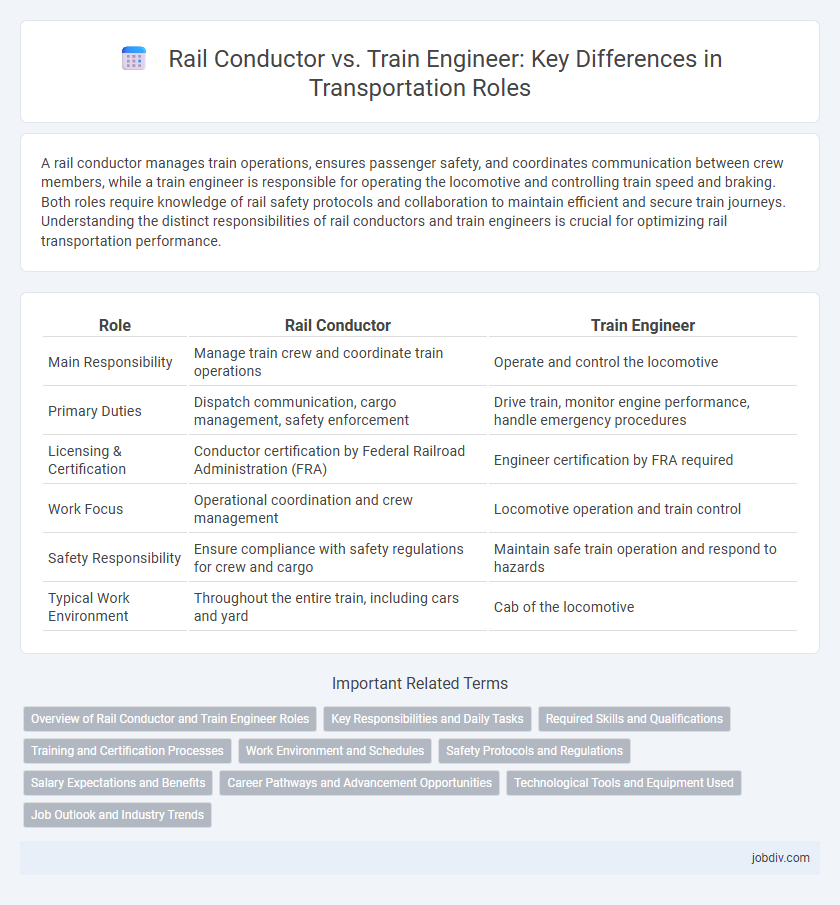A rail conductor manages train operations, ensures passenger safety, and coordinates communication between crew members, while a train engineer is responsible for operating the locomotive and controlling train speed and braking. Both roles require knowledge of rail safety protocols and collaboration to maintain efficient and secure train journeys. Understanding the distinct responsibilities of rail conductors and train engineers is crucial for optimizing rail transportation performance.
Table of Comparison
| Role | Rail Conductor | Train Engineer |
|---|---|---|
| Main Responsibility | Manage train crew and coordinate train operations | Operate and control the locomotive |
| Primary Duties | Dispatch communication, cargo management, safety enforcement | Drive train, monitor engine performance, handle emergency procedures |
| Licensing & Certification | Conductor certification by Federal Railroad Administration (FRA) | Engineer certification by FRA required |
| Work Focus | Operational coordination and crew management | Locomotive operation and train control |
| Safety Responsibility | Ensure compliance with safety regulations for crew and cargo | Maintain safe train operation and respond to hazards |
| Typical Work Environment | Throughout the entire train, including cars and yard | Cab of the locomotive |
Overview of Rail Conductor and Train Engineer Roles
Rail conductors coordinate train operations, manage cargo and passenger safety, and communicate between crew members and dispatchers. Train engineers operate locomotives, control speed and braking systems, and monitor instrument panels to ensure safe and efficient travel. Both roles are critical for maintaining rail system safety, punctuality, and service quality.
Key Responsibilities and Daily Tasks
Rail conductors manage passenger safety, coordinate train schedules, and oversee cargo loading and unloading, ensuring compliance with federal regulations. Train engineers operate locomotives, control train speed, monitor mechanical systems, and communicate with dispatchers to maintain safe and efficient travel. Both roles require precise coordination to maintain timely rail operations and passenger safety.
Required Skills and Qualifications
Rail conductors require strong communication skills, knowledge of safety regulations, and the ability to manage passenger or cargo logistics efficiently. Train engineers must possess in-depth technical expertise in operating locomotives, a thorough understanding of mechanical systems, and certification from relevant authorities such as the Federal Railroad Administration (FRA). Both roles demand acute attention to detail, problem-solving abilities, and adherence to strict safety protocols to ensure smooth rail operations.
Training and Certification Processes
Rail conductors undergo training focused on safety protocols, communication, and operational procedures, typically completing certification through the Federal Railroad Administration (FRA) requirements. Train engineers receive extensive hands-on training in locomotive operations, signaling systems, and mechanical knowledge, followed by rigorous FRA certification exams to ensure competence in controlling train movements. Both roles demand continuous education and periodic recertification to maintain compliance with evolving safety standards and regulations.
Work Environment and Schedules
Rail conductors typically work both on trains and at stations, coordinating passenger service and safety, often facing irregular hours that include nights, weekends, and holidays. Train engineers operate locomotives, concentrating on train movement and mechanical functions, generally adhering to scheduled routes but enduring extended periods away from home. Both roles require adaptability to fluctuating weather conditions and demanding physical activity within dynamic, sometimes high-stress environments.
Safety Protocols and Regulations
Rail conductors ensure passenger safety by coordinating boarding, communicating with crew, and enforcing safety protocols according to Federal Railroad Administration (FRA) regulations. Train engineers operate locomotives, maintaining speed limits and braking procedures while adhering to strict guidelines to prevent accidents and ensure track safety. Both roles require comprehensive knowledge of the Occupational Safety and Health Administration (OSHA) standards and continuous compliance with railway safety management systems.
Salary Expectations and Benefits
Rail conductors typically earn an average salary ranging from $50,000 to $70,000 annually, with benefits including health insurance, retirement plans, and paid vacation. Train engineers often command higher salaries, averaging between $70,000 and $90,000 per year, reflecting their advanced technical responsibilities and certifications. Both positions offer job security through union membership and opportunities for overtime pay, but train engineers generally access enhanced benefits due to their specialized skills and experience.
Career Pathways and Advancement Opportunities
Rail conductors typically focus on operational coordination, overseeing passenger safety and cargo management, making their career advancement opportunities often lead toward supervisory roles in train operations or logistics management. Train engineers specialize in maneuvering locomotives, requiring extensive technical knowledge and certification, with advancement pathways including lead engineer positions or transitioning into roles like railroad operations management or training instructors. Both careers demand continuous skill development, yet engineers generally pursue more technical certifications, while conductors enhance leadership and communication skills to progress.
Technological Tools and Equipment Used
Rail conductors utilize communication devices, ticketing systems, and safety monitoring tools to coordinate passenger services and ensure operational compliance. Train engineers operate advanced locomotive control systems, including computerized throttle controls, braking technologies, and diagnostic software to manage train speed, traction, and mechanical performance. Both roles rely on GPS tracking and real-time data analytics to maintain efficient scheduling and safety protocols in rail transportation.
Job Outlook and Industry Trends
Rail conductors are responsible for coordinating train operations and ensuring passenger safety, with job growth projected at 2% over the next decade due to ongoing infrastructure investments. Train engineers operate locomotives and require advanced technical skills, with demand expected to remain stable as freight rail continues to support e-commerce and supply chain logistics. Both roles benefit from advancements in rail technology, including automation and positive train control systems, shaping future employment opportunities in the transportation industry.
Rail Conductor vs Train Engineer Infographic

 jobdiv.com
jobdiv.com